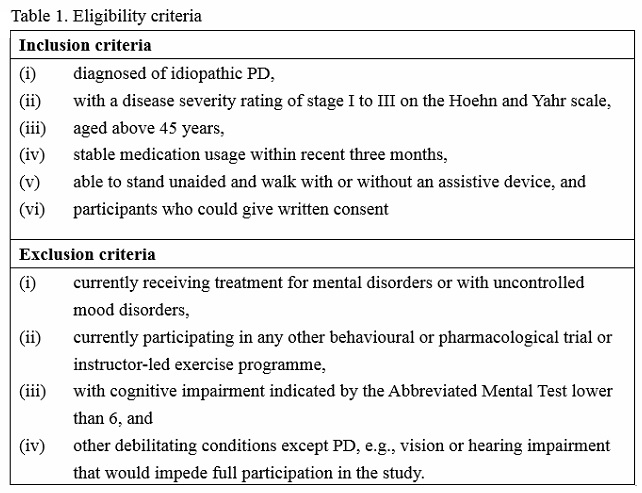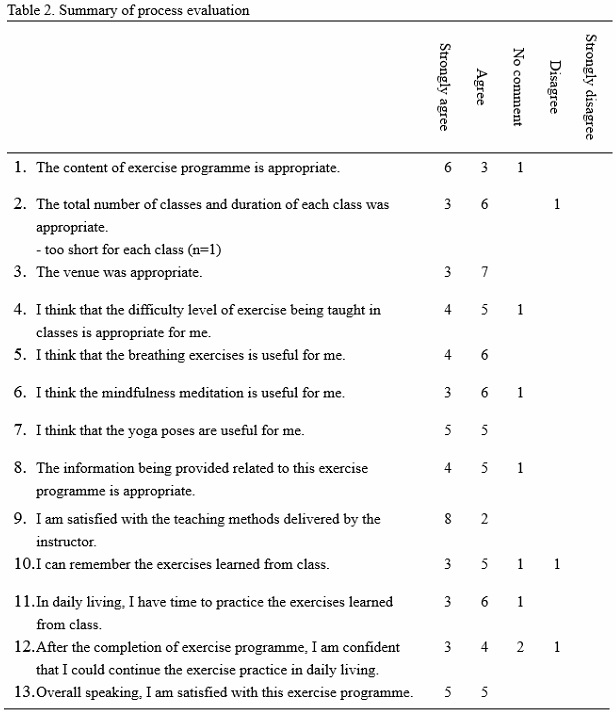Session Information
Date: Monday, June 5, 2017
Session Title: Quality Of Life/Caregiver Burden in Movement Disorders
Session Time: 1:45pm-3:15pm
Location: Exhibit Hall C
Objective: This study aimed to examine the feasibility of a mindfulness yoga programme among people with PD.
Background: Psychological distress like anxiety and depression is prevalent among PD population, which further aggravates one’s physical symptoms and HRQoL. Mind-body interventions, such as yoga, that teach mindfulness along with physical activity may be well suited for reducing psychological distress in people with PD (1).
Methods: A pilot study was conducted from Sept to Nov, 2016. People with mild to moderate idiopathic PD were recruited (Table 1: eligibility criteria). Assessments were done before and after completion of this 8-weekly yoga programme. Outcome measures included: psychological disease (Hospital Anxiety and Depression Scale), chronic stress (heart rate variability), motor symptoms ( MDS-UPDRS III), mobility, balance and fall risk (Timed Up and Go test), spiritual wellbeing ( Holistic Wellbeing Scale), and HRQoL (PDQ-8). The 60 minutes yoga classes included controlled breathing, mindfulness meditation and yoga poses designed specifically for PD. Process evaluation was done. Ethics approval was granted (CUHK-CREC 2016.323-T).
Results: A convenience sample of 10 PD participants completed the study. The enrolment rate was 58.8% and class adherence rate was 97.5%. There was no adverse event. Results of process evaluation were summarized in Table 2. All participants were satisfied with this programme. Perceived benefits included improving flexibility, gait and balance and constipation, lessen back and shoulder pain, relaxing body and mind, easier to fall into sleep, less anxious, calmer and better mood. Significant improvements were found for psychological distress (p=0.006) with a moderate effect size of 0.4 and spiritual wellbeing. Future protocol was suggested to increase the duration of each class from 60-minute to 90-minute, so as to ensure adequate time for teaching and learning in a stepwise approach among participants with PD symptoms. Bi-weekly self-practice gatherings were self-initiated by participants after completion of the programme, indicating their interest and motivation in continuing yoga practice.
Conclusions: The mindfulness yoga intervention and study procedures were feasible for people with mild to moderate PD. Improvements in psychological distress, symptoms perceptions and wellbeing merit more powered and controlled future studies of mindfulness yoga in PD population.
References: (1) Kwok, J. Y., Choi, K. C., & Chan, H. Y. (2016). Effects of mind-body exercises on the physiological and psychosocial well-being of individuals with Parkinson’s disease: A systematic review and meta-analysis. Complement Therapies in Medicine, 29, 121-131. doi: 10.1016/j.ctim.2016.09.016
To cite this abstract in AMA style:
JJ.Y.-Y. Kwok, J.C.-y. Kwan, H.Y.-L. Chan. A pilot study of mindfulness yoga on psychological distress in people with Parkinson’s Disease (PD) [abstract]. Mov Disord. 2017; 32 (suppl 2). https://www.mdsabstracts.org/abstract/a-pilot-study-of-mindfulness-yoga-on-psychological-distress-in-people-with-parkinsons-disease-pd/. Accessed April 18, 2025.« Back to 2017 International Congress
MDS Abstracts - https://www.mdsabstracts.org/abstract/a-pilot-study-of-mindfulness-yoga-on-psychological-distress-in-people-with-parkinsons-disease-pd/


